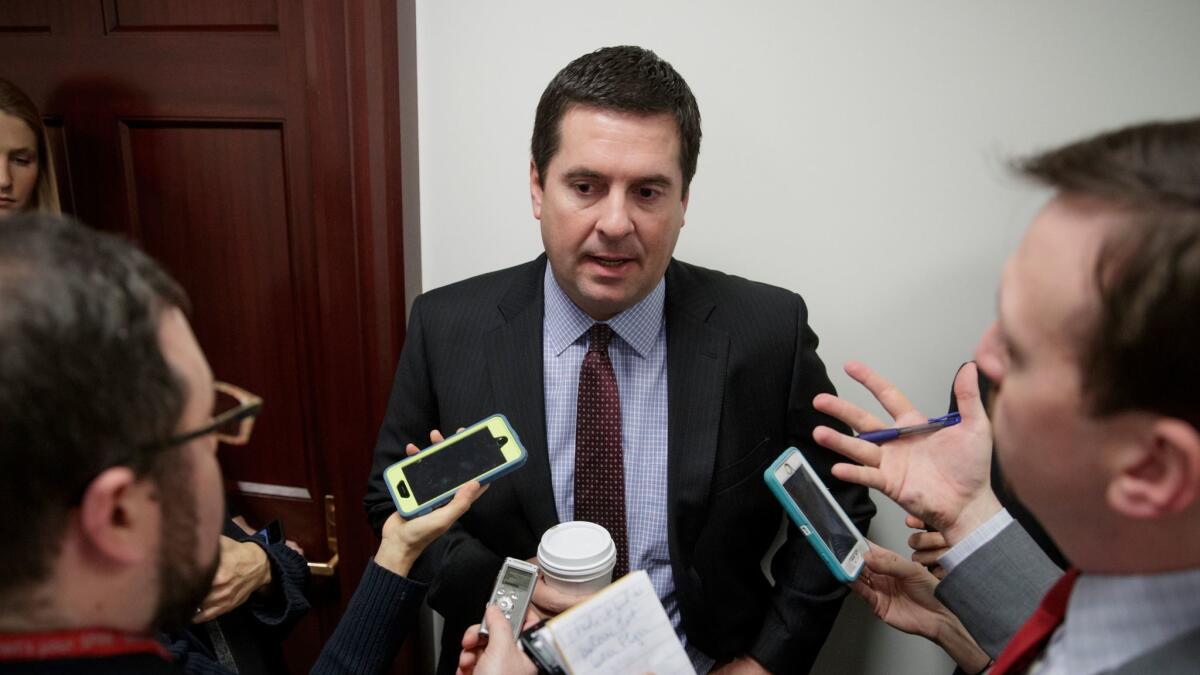Op-Ed: We need answers to questions about Russia and the White House that California Rep. Devin Nunes won’t even ask

- Share via
“I think we all need answers…. I’m not sure the right avenue to take. I am sure, though, that that question needs to be answered.”
Those are the words not of Sen. Charles E. Schumer, Tom Perez or any other partisan Democrat but of former President George W. Bush, speaking Monday, and the questions pertain to Russia’s role in trying to rig the 2016 presidential election.
We know, thanks to the consensus estimate of the U.S. intelligence community, that Russia was behind the hacking of email accounts at the Democratic National Committee and at Hillary Clinton’s campaign. What we don’t know is whether there was any collusion between the Trump campaign, which benefited from these leaks, and the Kremlin, which orchestrated them.
The New York Times has reported “that members of Donald J. Trump’s 2016 presidential campaign and other Trump associates had repeated contacts with senior Russian intelligence officials in the year before the election.” Sergei A. Ryabkov, Russia’s deputy foreign minister, confirmed shortly after the election that “a number” of members of Trump’s “immediate entourage” had “maintained contacts with Russian representatives.”
Such contacts are now furiously denied by Trump and his aides. Given, however, the frequency with which the president and his spokespeople lie — according to the Washington Post, Trump averaged four falsehoods a day during the first 33 days of his presidency — there is no reason to take them at their word.
It is damning to learn, as we did thanks to the Washington Post, that White House officials Reince Preibus and Sean Spicer tried to enlist the FBI and CIA, along with the chairmen of the House and Senate intelligence committees, to counter allegations of ties between Russia and Trump. The FBI refused to help, but CIA Director Mike Pompeo apparently complied with this improper request. This is all too reminiscent of the kind of cover-up that the Nixon administration engaged in after the Watergate break-in, and it raises the question of what the White House is trying to hide.
There could be quite a lot. Remember the dossier compiled alleging that the Kremlin could be blackmailing Trump? “They are continuing to chase down stuff from the dossier, and, at its core, a lot of it is bearing out,” an “intelligence official” told the New Yorker. Meanwhile, the Washington Post reports that the dossier’s author, former British intelligence agent Christopher Steele, was considered credible enough that the FBI was planning to pay him to investigate the allegations before the dossier leaked out.
A credible investigation is clearly in order, but there is considerable doubt as to whether a Republican-controlled Congress can carry it out. Even if the House and Senate intelligence committees were inclined to mount an aggressive inquiry, they lack the means to do so. The House Intelligence Committee, for example, has less money than any other national security committee — just $9.2 million over the last two years, with which it is supposed to perform oversight on 17 intelligence agencies. The House Benghazi Committee, charged with investigating a single attack, spent $7.8 million over 2 ½ years.
The deeper problem is not lack of resources but lack of motivation. Rep. Devin Nunes (R-Tulare), chairman of the House Intelligence Committee, and Sen. Richard M. Burr (R-N.C.), his Senate counterpart, are prominent Trump supporters, with Nunes having been closely involved in the transition. Nunes’ partisanship knows no bounds — he has compared the legitimate questions about Kremlingate to “McCarthyism revisited,” saying that this is another “witch hunt against innocent Americans.” On Monday he told reporters “there’s nothing there,” when the investigation has only begun.
He has also said that Michael Flynn, the recently fired national security advisor, did the country a “big favor” for which he should be “thanked” if he signaled to Vladimir Putin before the inauguration not to respond to sanctions designed to punish him for interfering in our election. Well, that’s one way to look at it. Another way is that Flynn was colluding with a hostile foreign power to undermine the foreign policy of the sitting president in violation of the 1799 Logan Act. Burr has been a little more judicious but he, too, is compromised by his flackery on behalf of the White House.
If the House and Senate won’t conduct a credible investigation, a bipartisan, 9/11-style commission would do the trick, but that would require legislation that Republicans are unlikely to pass. That leaves only one real option: Atty. Gen. Jeff Sessions, a Trump crony, must be pressured into appointing a special counsel to look into this business. California’s Darrell Issa (R-Vista), the chairman of the House Oversight Committee, made that very suggestion Friday before backing off under fierce pressure from his fellow Republicans.
Kremlingate may amount to very little — or it may become a scandal that will consume the Trump presidency. We just don’t know. It’s in the best interests of the country, and especially Trump, to get to the bottom of it so that it doesn’t become a debilitating distraction.
Max Boot is a contributing writer to Opinion and a fellow at the Council on Foreign Relations.
Follow the Opinion section on Twitter @latimesopinion and Facebook
More to Read
A cure for the common opinion
Get thought-provoking perspectives with our weekly newsletter.
You may occasionally receive promotional content from the Los Angeles Times.






